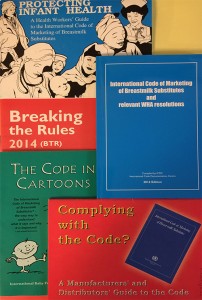The WHO Code (or simply, “The Code”) is a short name for the International Code of Marketing of Breastmilk Substitutes, which was adopted by the World Health Assembly and UNICEF in 1981. Since that time, a number of resolutions have also been passed to clarify and add to the Code.
The Code is a marketing code that aims to protect breastfeeding, to protect all mothers and babies (whether breastfeeding, formula-feeding or combination feeding) and to prevent aggressive marketing practices that often prevent mothers from meeting their own breastfeeding goals. Infant formula, feeding bottles, and artificial nipples are the main products that fall within the scope of the Code. Pacifiers and breast pumps are not under the scope of the Code. Note that the Code only applies to the marketing of these items– it does not affect whether they are sold or used.
Is the Code intended to make parents who use formula feel guilty? No!
The Code is primarily aimed at governments and companies. Health care workers and facilities also have a role to play.
“The aim of this Code is to contribute to the provision of safe and adequate nutrition for infants, by the protection and promotion of breastfeeding, and by ensuring the proper use of breastmilk substitutes, when these are necessary, on the basis of adequate information and through appropriate marketing and distribution.” — Article 1 of the Code
- It is not directed at parents.
- It does not advocate against parents choosing to use formula.
- It does require that parents be given complete and factual information about infant feeding including, when applicable, how to properly and safely prepare infant formula.
- It does not suggest that formula sales to the public should be limited.
- It does require that infant formula meet strict quality standards, that the label include clear instructions for safe preparation, and that inappropriate foods (such as canned milk, rice milk, etc.) not be advertised for use as the sole source of nourishment for babies.
- It does say that companies should stop marketing practices that undermine breastfeeding and prevent mothers from meeting their own breastfeeding goals.
- It does say that, instead of advertising hype, parents who use formula should receive unbiased, factual information.
More information
The International Code of Marketing of Breast-Milk Substitutes – 2017 Update: Frequently asked questions (World Health Organization)
Understanding the International Code (IBFAN)
A Summary of the WHO Code (Unicef)
Why Keep Infant Formula Marketing Out of Healthcare Facilities? (KellyMom)
The WHO Code and You (ILCA – written for IBCLCs)
Summary of WHA Resolutions Relevant to the Code (INFACT Canada)
International Baby Food Action Network: Overview of Code Monitoring (IBFAN)
How to report unethical promotion of formula, bottles and other breastmilk substitutes (PhD in Parenting)
International Code Documentation Center – Report Code violations here.
Looking for WHO Code compliant companies? See On the Trail of Code Compliancy

